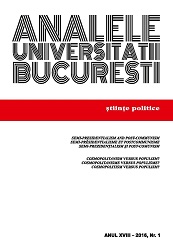Cosmopolitanism and Populism: from Incompatibility to Convergence, and Back
Cosmopolitanism and Populism: from Incompatibility to Convergence, and Back
Author(s): Tamara CărăuşSubject(s): Politics / Political Sciences, Politics, Political Theory, Political Sciences, Civil Society
Published by: Editura Universităţii din Bucureşti
Keywords: cosmopolitanism; populism; emancipatory politics; global protests
Summary/Abstract: Cosmopolitanism and populism are opposing concepts: populism usually sees persons as embedded in national or ethnic communities, while the core idea shared by all cosmopolitan views is that all human beings belong to a single community and the ultimate units of moral concern are individual human beings, not particular forms of human associations. However, the paradigm of conceiving both cosmopolitanism and populism is changing. Authors discover the promise and relevance of populism, while within the political theory of cosmopolitanism there are calls towards ‘roots’, as in the concept of rooted or vernacular cosmopolitanisms. In this new theoretical context, the incompatibility between populism and cosmopolitanism is weakening, points of convergence between two concepts start becoming visible. This paper examines the confluences between populism and cosmopolitanism, and assesses the limits of this convergence. Thus, the first section of the paper examines the main features of populism, seen mostly from the perspective of populism as a pathology. The second section examines the proposals to see populism as part of emancipatory politics, showing that this perspective of conceiving populism is compatible with cosmopolitanism. The third section identifies the populist emancipatory elements in a cosmopolitan discourse and action, while the fourth section examines the possible criticism of cosmopolitan populism, pointing that most of the criticism of populism in the state context is not valid for populism in a cosmopolitan context. The conclusion shows that a cosmopolitan populism is not part of a vision of cosmopolitanism as eternal peace and global consensus, but of a contestatory and agonistic cosmopolitanism.
Journal: Analele Universităţii din Bucureşti. Seria Ştiinţe Politice
- Issue Year: XVIII/2016
- Issue No: 1
- Page Range: 83-102
- Page Count: 20
- Language: English

